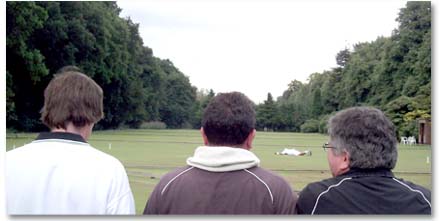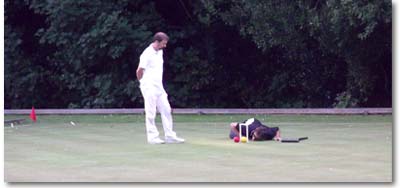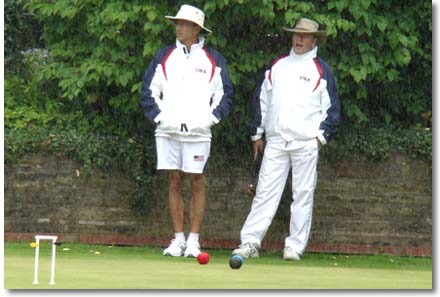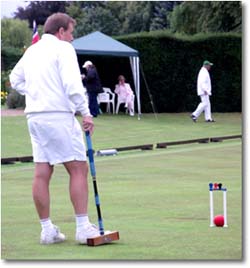

|
Back to |
| The Front Page |
| News & Features |

|
Beyond the Mac: How many and which World Championships can the sport support? |
|
by Bob Alman photos by Adrian Wadley, Paddy Chapman, Eileen Soo, and Charles Carne. Posted September 27, 2010
|
What organizing principles will guide the orchestration of a 10-year calendar of WCF-sanctioned World Championships? Age, with separate championships for "under 21" and "over 50" as well as the traditional rank-based overall World Championship? Gender, with both a women's and a men's that allows in the occasional qualified female? Or championships for different forms of the game? Association laws govern the first and foremost championship, but thanks to Egypt, the Golf Croquet World Championship is a huge success, while the 14-point game World Championship, held only once, languishes along with a potential but highly unlikely American Rules World Championship. In the small sport of organized croquet, how many and which world championships should there be, before the world championship brand itself is critically diluted? We make a small start in addressing some of the questions to be answered by the WCF Management Committee in the upcoming years
The 2010 MacRobertson Shield in England, organized and produced at a time of world-wide economic recession, was nevertheless a breakthrough event, incorporating four tiers of team play embracing more than a dozen developing countries in week-long tests at the end of the "Tier One" competition, the traditional 17-day MacRobertson Shield test matches among the "big four" - Great Britain, New Zealand, USA, and Australia.
But bad economic times might have influenced some false starts for the next editions of some major WCF events. The first-announced hosts for the 2011 WCF World Championship (individual, Association) on the western Sunshine Coast were eventually replaced by South Australia hosts. And the Canadian hosts of the second Women's World Championship in Golf Croquet withdrew entirely, pointing to their inability to attract financial sponsorship.

|
| There were some very long days during the NZ v GB test - test match croquet at its best. Aaron Westerby, Paul Skinley and Charles Jones watch Stephen Mulliner peg out. Chapman photo. |
The WCF's new Secretary-General, Chris Clarke, comments, "Since taking over as SG, I have tried to ensure that bids are subjected to more rigourous checks [before they are announced officially] to avoid the issues experienced with the Sunshine Coast and Canadian bids." He gives the example of a New Zealand bid to hold the Women's World Golf Croquet Championship in November 2011, currently in the bid review stage.
Clarke is optimistic about the future of other new championships, citing the Management Committee's high priority of creating a rolling ten-year calendar of WCF events throughout the world, beginning with a number of events currently in the pipeline:
- October 2010, Cairo: The first Over-Fifty World Golf Croquet Championship.
- June 2011, Cheltenham: WCF European Invitation Team Championship.
- July 2011, London: WCF World Golf Croquet Championship.
- May 2012, Adelaide: WCF World Association Croquet Championship.
The Council that met at the end of the 2010 MacRob, with voting representatives from all the full WCF members, discussed many of these events and voted on a number of importance measures. The Council agreed to hold at some time in the future a World Golf Croquet Team Championship, and to proceed with the still-controversial WCF World Women's Association Croquet Championship.

|
| USA's Ben Rothman at Roehampton helped the team achieve its biggest win ever in the Mac: USA 14, Australia 7. Charles Carne photo. |
Clarke acknowledges that there is no ideal calendar of events, because conditions vary widely from country to country. A nation like England worries that too many WCF championship events will negatively impact their domestic calendar. Egypt, on the other hand, which has lavishly hosted many Golf Croquet events, would like to see a Golf Croquet World Championship annually. At the same time, America's USCA, with no financial help from government agencies, is often hard-pressed to generate sufficient funds to host a world event in the face of other financial priorities.
More financial help for hosts of WCF events
| WHERE DOES THE MONEY GO? |
|
In addition to the managing the logistics, communication, and administration associated with organizing world championships, the World Croquet Federation's main priority is development, which includes sending experts to run coaching and refereeing courses, usually on weekends, and helping to finance facilities and equipment. According to Secretary-General Chris Clarke, "We are in discussion with Norway, who are hoping to improve a four-lawn venue that would be accessible to Sweden as well." Norway has requested 10,000 pounds from the WCF to help with this project. The WCF is also encouraging the building of a new two-lawn facility in Hamburg, Germany. Mainland Europe has shown the greatest potential, where the WCF can escalate development by "filling in" the map to facilitate more intra-European competition, such as the European teams event scheduled for Cheltenham in June 2011. Potential new observer countries - the first level of WCF membership - include Latvia, Pakistan, Portugal, and Qatar.
|
Clarke has told CROQUET WORLD, "It should be noted that the entry fee only accounts for a small part of some budgets and so is not a major factor. It is WCF policy that we retain the right to entry fees from WCF events, and this reduction may be only temporary. We have not spent as much as expected on development over the past years, which, in conjunction with the President and Secretary-General not taking any remuneration or expenses until this year, has meant that the WCF has substantial reserves." The Council voted to slightly increase the entry fee to the equivalent of 8 British pounds per player per day, which means that a 7-day world championship for 64 players (for example) would return to the host close to two thousand pounds - an amount sufficient to provide daily meals to participants or provide other amenities not required to obtain official WCF sanction.
World championships authorized but unscheduled
Perhaps because of the precedent established in Egypt, which has championships segregated by gender, the WCF Golf Croquet Women's World Championship has not been the subject of much controversy. Even women who oppose in principal segregation by gender have supported the Golf Croquet events as a way of getting women more involved in competition in a game highly favored by organizers for its comparative simplicity and excellent spectator values in attracting new players to the sport. The issue of whether the Women's World Championship for Association Croquet should be promoted by the WCF, on the other hand, has been hotly debated, both within the Management Committee and within the croquet world at large, and is the subject of a recent CROQUET WORLD article.

|
| An unusual situation: Greg Bryant's yellow for #2 can neither run the hoop nor hit red. Red cannot hit yellow. Greg Bryant is being refereed by Martin French at Nottingham. Chapman photo. |
The Management Committee of the World Croquet Federation had recently voted narrowly (5-4) to introduce a Women's World Championship (individual Association) which, however, would not preclude women from competing in the open, mixed-gender World Championship. The announcement stirred heated comment worldwide, as the issue had been brought up a number of times before, and then tabled.
Arguing passionately in favor of championships segregated by gender, Rosemary Graham of Australia reported to the Council her limited survey of the 32 women who played in Australia's Women's Championship, with 23 of 24 of the respondents favoring an Association Croquet world championship for women. Separate men's and women's championship are most popular in Australia, as well as mixed doubles. Some have suggested that Australia's national women's events be promoted to the entire world, in the same way that the British Open was once the "de facto" open world championship before the creation of the WCF.

|
| Damp weather was a player in the USA/Great Britain test in Manchester. Rich Lamm has just hit in and discusses with partner Jeff Soo what leave to make in game 2 against Maugham and Beijderwellen. Eileen Soo photo. |
Jenny Clarke of New Zealand, the top-ranked woman player in the world, had already announced a WCF-endorsed two-year survey to measure women's response to the idea of the Women's World Championship in Association Croquet. Critics have pointed out that most of the vocal opposition is coming from highly ranked women players, while men generally seem to approve the idea - which accounts, perhaps, for its barely-sufficient approval by the newly elected Management Committee after being tabled as a voting issue several times in the past. CROQUET WORLD has not been able to determine the exact status of the survey or its intended purpose, given the intention of the WCF to proceed with the event by offering it for bids before the survey is completed.
A motion to delay a decision on putting the Women's Association World Championship on the WCF calendar until the survey was completed went down in defeat by a vote of 9-6, with only the USCA and the English Croquet Association voting in favor and New Zealand, Australia, Egypt, and Scotland voting against. So the Council agreed to begin the bid process for the Women's World.
At last, England is a single country!

|
| As tension mounted, very few players were immune to making uncharacteristic errors, despite the easy conditions. Robert Fulford contemplates at Nottingham on Day 1 of the GB/NZ test. Chapman photo. |
Consequently, in the next MacRobertson Shield, the "big team" on those islands will likely be from England only, permitting the other national and sub-national entities to continue to compete in the lower tiers - which is certainly preferable from the standpoint of regional development, and which will only marginally if at all affect England's strength in the next MacRob.
ADRIAN WADLEY'S SURBITON ALBUM
The photographer shot these photos on the third day of the final five-day tests, all at Surbiton: US v New Zealand and UK vs Australia. You can also link here to his Surbiton Slide Show.

|
|
JAMES HAWKINS, CO-EDITOR
"The other three nations have youth on their side. Where's the new English teen sensation?" The casual observer might see the closeness of the 2010 results and interpret them as a slip in the English supremacy of international croquet. An ongoing back injury forced out the British (and World) number one, Chris Clarke. This upset to the team order gave us the last minute inclusion of Ian Lines – not such an exciting player to watch, but an efficient and steady Number Six for any team. That is the main strength of British croquet; the lower orders are able to step in at the last minute, and provide effective opposition to even the strongest of rivals. It’s said, in some quarters, that the English triumvirate of Fulford, Maugham and Clarke look past their prime, as they enter their early 40s. Where are the next generation of up and coming talent? The other three nations have youth on their side, with the appearance of Paddy Chapman (NZ), Robert Fletcher (Australia) and Ben Rothman (USA). Where’s the new English teen sensation? On the other hand, youth need not dominate in a sport that allows players to flourish into their 80's. Stephen Mulliner is the key example of a survivor in the game – now in his 50s, he made his test debut in 1982, and continues with undiminished power. Fulford, having married this year, devoted less time to playing and practising, but remains the same daunting opponent he always was. Rutger Beijderwellen looks like he could establish himself as the bedrock of the English team. Meanwhile, it’s the New Zealanders who are the nation to watch. Paddy Chapman is set for great things over the coming years. He’s now settled in England, and will doubtlessly immerse himself in the high-class tournament scene of the British circuit. At the same time, Chris Clarke, now resident in New Zealand, is mentoring new talent there. Perhaps I’m over-stressing the youth factor, but one has only to look at the Fletcher phenomenon in Australia. Robert Fletcher is the most experienced of four brothers who live on a farm remote from croquet facilities, any one of whom could burst into glory on the next test team. Or maybe we’ll see an army of Americans rise from nowhere. In a sport without the sponsorship and funding of many others, croquet has none of the professional youth academies and national programmes for developing talent which are evident in major sports. Champions can materialise unannounced, and sway the balance of croquet power very quickly. Maybe we’re seeing the start of that process in Australia, just as the Robert Fulford / Chris Clarke / David Maugham era dawned 25 years ago. |
|
JEFF SOO, USA TEAM CAPTAIN
"Winning the Mac has always been a long-distance race, but we are true contenders now." There are many positives we can take from this Mac, along with the harsh lesson delivered by the Kiwis. Our 28 match wins ties the high point we established in 2003. We had a winning doubles record overall (14/27), and Bast & Huneycutt's 6/9 doubles record is a new high for Team USA at a Mac. 41 total triple peels is another new high for us, as is winning a test 14-7, and scoring 9 points on the Brits in a Mac test. Every player had at least one win in each test. We functioned well as a team, having found a good balance of communication and support while still keeping it fun and relaxed. We shot very well, and had a high rate of conversion on Supershot openings. Having Erv Peterson along as Team Manager was invaluable. The Kiwis have been showing us for years that the Brits are beatable, and we're finally getting the idea. Winning the Mac has always been a long-distance race, but we are true contenders now. |
|
CHRIS CLARKE, WCF SECRETARY-GENERAL
"England won, but the sport won more..." When Great Britain nearly lost the Mac in 2000, there were many questions asked as to why, but the fact that we had beaten Australia 20-1 and USA 19-2 meant that this was just a momentary blip of New Zealand playing well and GB under performing. The 2010 Mac was no such thing. With wins of 12-9, 11-10 and 14-7, GB can consider themselves fortunate to have retained the Shield. In fact, NZ won more matches than GB. Whilst GB clearly under performed, there is also strong evidence that the other countries have become stronger. This is very positive for the sport. Great Britain won, but the sport won more. We now have a vibrant competition with exciting talented younger players like Chapman and Fletcher and plenty more Antipodean youngsters in the pipeline. The next event will be held in Jan/Feb 2014 in New Zealand. Surely Great Britain can't keep getting away with picking the old fogies? Will Australia be fifty percent Fletchers? Only time will tell. |
CROQUET WORLD thanks Chris Clarke, Secretary-General of the WCF, for his helpful responses to our questions. He notes that his comments as represented in this article "have not been run past the Management Committee and are merely my best attempt at explaining the general view, combined with some personal comments." Clarke is a British citizen resident in New Zealand who was on the UK MacRob team until shortly before the 2010 Mac, when he announced his retirement as a competitive player. He has been at or near the top of the world rankings for many years and retired in the #1 position.